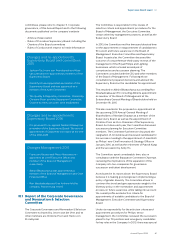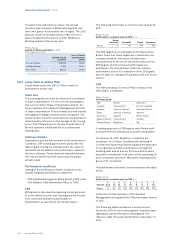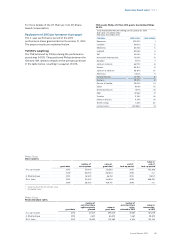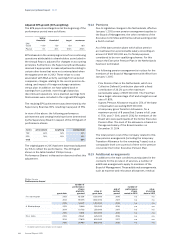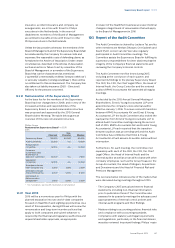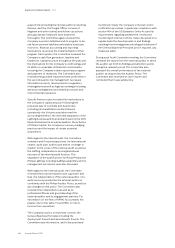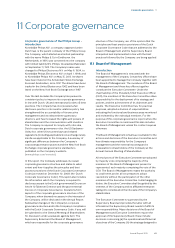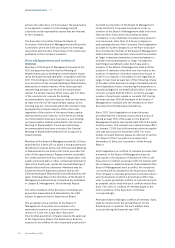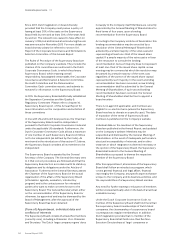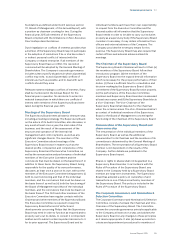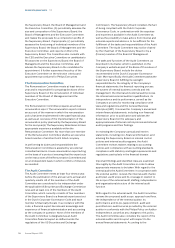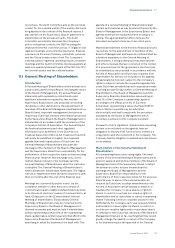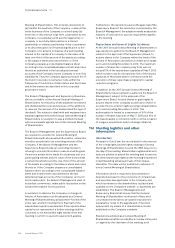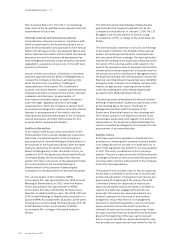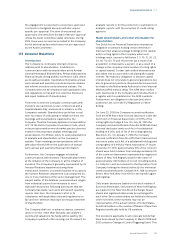Philips 2015 Annual Report Download - page 91
Download and view the complete annual report
Please find page 91 of the 2015 Philips annual report below. You can navigate through the pages in the report by either clicking on the pages listed below, or by using the keyword search tool below to find specific information within the annual report.Corporate governance 11.1
Annual Report 2015 91
Amount and composition of the remuneration
of the Board of Management
The remuneration of the individual members of the
Board of Management is determined by the
Supervisory Board on the proposal of the
Remuneration Committee of the Supervisory Board,
and must be consistent with the policy thereon as
adopted by the General Meeting of Shareholders. The
current remuneration policy applicable to the Board of
Management was adopted by the 2013 Annual General
Meeting of Shareholders, and is published on the
Company’s website. A full and detailed description of
the composition of the remuneration of the individual
members of the Board of Management is included in
section 10.2, Report of the Remuneration Committee, of
this Annual Report
.
Pursuant to Dutch legislation, the implementation of
the remuneration policy during the nancial year must
be included as a separate agenda item in the convening
notice for a General Meeting of Shareholders and must
be dealt with before the meeting can proceed to
consider and adopt the Annual Accounts.
The remuneration structure of the Company, including
severance pay, is such that it promotes the interests of
the Company in the medium and long-term, does not
encourage members of the Board of Management to
act in their own interests and neglect the interests of the
Company, and does not reward failing members of the
Board of Management upon termination of their
employment. The level and structure of remuneration
shall be determined in the light of factors such as the
results, the share price performance and other
developments relevant to the Company. Deviations on
elements of the remuneration policy in extraordinary
circumstances, when deemed necessary in the
interests of the Company, will be disclosed in the
Annual Report or, in case of an appointment, in good
time prior to the appointment of the person concerned.
All current members of the Board of Management are
engaged by means of a services agreement
(overeenkomst van opdracht), as Dutch legislation
prohibits a member of the Board of Management to be
employed by means of a contract of employment. In
case of the appointment or re-appointment of a
member of the Board of Management, the main
elements of the services agreement - including the
amount of the fixed base compensation, the structure
and amount of the variable compensation component,
any severance plan, pension arrangements and the
general performance criteria - shall be made public no
later than at the time of issuance of the notice
convening the General Meeting of Shareholders in
which a proposal for (re-)appointment of that member
of the Board of Management has been placed on the
agenda. In compliance with the Dutch Corporate
Governance Code, the term of the services agreement
of the members of the Board of Management is set at
four years and, in case of termination, severance
payment is limited to a maximum of one year’s base
compensation.
From 2003 until 2013, Philips maintained a Long-Term
Incentive Plan (LTI Plan) consisting of a mix of restricted
shares rights and stock options for members of the
Board of Management, Philips executives and other key
employees. Since the full revision in 2013 of the LTI Plan
applicable to members of the Board of Management,
the plan consists of performance shares only, with a
three year post-grant performance measurement. For
more details please be referred to section 10.2, Report
of the Remuneration Committee, of this Annual Report.
The so-called ultimum-remedium clause and claw-
back clause of best practice provisions II.2.10 and II.2.11
of the Dutch Corporate Governance Code are
applicable to Annual Incentive payments and LTI grants
for the year 2009 onwards to all members of the Board
of Management. In respect of the LTI grants, the
ultimum remedium clause can be applied to the
performance-related actual number of stock options,
restricted share rights and/or performance shares that
is granted. In addition, pursuant to Dutch legislation
(eective January 1, 2014), the Supervisory Board is
authorized to change unpaid bonuses awarded to
members of the Board of Management if payment or
delivery of the bonus would be unacceptable according
to the principles of reasonableness and fairness. The
Company, which in this respect may also be
represented by the Supervisory Board or a special
representative appointed for this purpose by the
General Meeting of Shareholders, may also claim
repayment of bonuses paid or delivered (after
December 31, 2013) insofar as these have been granted
on the basis of incorrect information on the fulfillment
of the relevant performance criteria or other conditions.
Bonuses are broadly defined as ‘non-fixed’
remuneration, either in cash or in the form of share-
based compensation, that is conditional in whole or in
part on the achievement of certain targets or the
occurrence of certain circumstances. The explanatory
notes to the balance sheet shall report on any
moderation and/or claim for repayment of board
remuneration. No such moderation or claim for
repayment has occurred during the nancial year 2015.
Dutch legislation also provides for an obligation for the
Company to reduce the remuneration of a member of
the Board of Management, if and to the extent the value
of such member’s share-based remuneration would
have increased as a result of the announcement of a
large transaction (requiring shareholder approval) or a
public oer for the Company.
Members of the Board of Management hold shares in the
Company for the purpose of long-term investment and are
required to refrain from short-term transactions in Philips
securities. According to the Philips Rules of Conduct on Inside
Information, members of the Board of Management are only
allowed to trade in Philips securities (including the exercise


